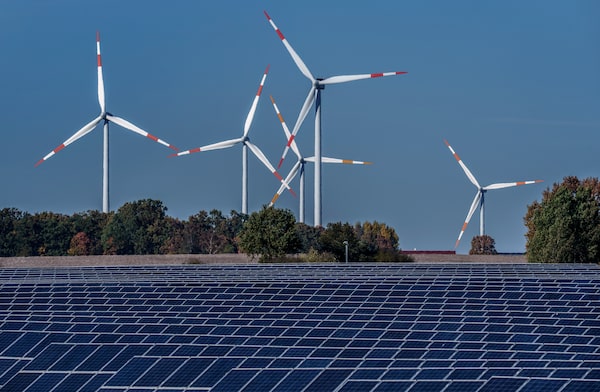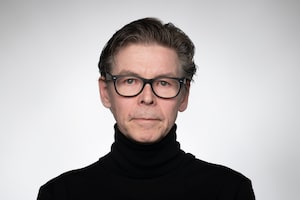
Wind turbines behind a solar farm in Rapshagen, Germany, on Oct. 28, 2021.Michael Sohn/The Associated Press
Can green investing save the planet? A new newsletter course from The Globe explores climate-conscious investing. Sign up today.
It’s coming down to the wire for money managers vying to be in charge of a total of $90-million of environmental, social and governance-themed investment portfolios.
This year, 60 of them devised their best sustainable investing strategies in hopes of winning mandates to set up portfolios for a group of charitable foundations, endowments and private trusts in what’s known as the Great Canadian ESG Championship.
Submissions for the high-stakes contest, from both big-name and little-known portfolio players, were put through the wringer in terms of evaluating ESG as well as financial prospects.
Now the field has been narrowed to 11, and next month they will give presentations to a panel of judges in hopes of winning the right to manage three funds on behalf of the investors. The sponsors are led by the Trottier Family Foundation and include the Skagit Environmental Endowment Commission, Foundation of Greater Montreal, Concordia University Foundation, Sitka Foundation, Consecon Foundation and McConnell Foundation.
The objective for hopefuls: deliver “reasonable” long-term financial returns along with maximum impact on social and environmental sustainability.
The organizers say the competition was designed to shine the spotlight on the responsible investing choices out there for Canadians and to promote best practices for integrating ESG into fund management. The event follows an “ESG Investing Olympics” conducted by Friends Provident Foundation in Britain a couple years ago.
The idea came about partly out of frustration, said Eric St-Pierre, executive director of the Trottier foundation, a charitable organization with about $200-million in assets under management. The foundation gets bombarded with pitches to manage its money, and became concerned about the risks of greenwashing: false or exaggerated claims about environmental righteousness.
“Sometimes you open the hood and you discover that there’s not much under the hood, and not in a positive way – it’s not an electric vehicle,” Mr. St-Pierre said. “So, we thought this might be a good opportunity to try to send a message to the sector that big institutional or philanthropic foundations actually really care about ESG investing … and we want to reward the ones that are robust.”
There’s no question that ESG investing is often confusing even for pros, given a multitude of different and sometimes competing standards for measuring and disclosing everything from climate risks to employment equity and diversity, in addition to the imperative to generate financial returns.
The shortlisted teams aim to manage one of three funds categorized by asset class.
AlphaFixe Capital, Lazard Asset Management, MacKenzie Investments and Schroders Investment Management are competing to manage a portfolio comprising equity and/or fixed income. PenderFund Capital Management, Portland Investment Counsel and UBS Asset Management are vying to oversee alternative assets, such as real estate, infrastructure and private equity. Fiera Capital, Jarislowsky, Fraser Ltd./Scotiabank, Rally Assets and RBC Global Asset Management/PH&N Institutional seek the title for a multi-asset category.
To qualify for the competition, the entrants had to be registered with Canadian securities regulators and be United Nations Principles for Responsible Investment signatories, though organizers waived the latter requirement for new and smaller players. That opened up the field to unexpectedly strong competition for the established managers, said Milla Craig, founder of Montreal-based consultancy Millani, which vetted the proposals for their ESG-related investment factors.
“They wanted to go out and create something that’s appealing for asset managers to put their best forward. And we were surprised – we’ve had to kind of defend our positions on some of the names at the top because they’re not the typical names that show up in the marketing around ESG,” Ms. Craig said.
There were basic guidelines for what to exclude from portfolio proposals, including obvious areas like tobacco, weapons and casinos. Some of the co-investors have their own exclusion lists. Trottier, for example, has a divestment policy for oil, coal and natural gas.
The finalists will present their pitches at an event in Montreal on June 2. The judges are Barbara Zvan, chief executive of University Pension Plan Ontario; Andrea Moffat, vice-president of Ivey Foundation; and Daniel Simard, strategic adviser, Bâtirente. They’ll offer live feedback and their assessments will help the investors make their final decisions on who gets the nod. Winners will be announced in the fall.
One notion the organizers and judges said they want to dispel is that investors must be prepared to give up some potential financial return in exchange for the focus on sustainable investing and environmental impact. Entries have been evaluated for their prospects of excelling in both ways, they said.
“That’s a long-time myth,” said Jean-Grégoire Morand – partner at Normandin Beaudry, which evaluated the financial aspects of the proposals – in reference to the idea of a financial-environmental tradeoff. In fact, as ESG disclosure and standards improve, these factors will become part and parcel of most investment strategies, he said.
Jeffrey Jones writes about sustainable finance and the ESG sector for The Globe and Mail. E-mail him at jeffjones@globeandmail.com.
Your time is valuable. Have the Top Business Headlines newsletter conveniently delivered to your inbox in the morning or evening. Sign up today.
 Jeffrey Jones
Jeffrey Jones